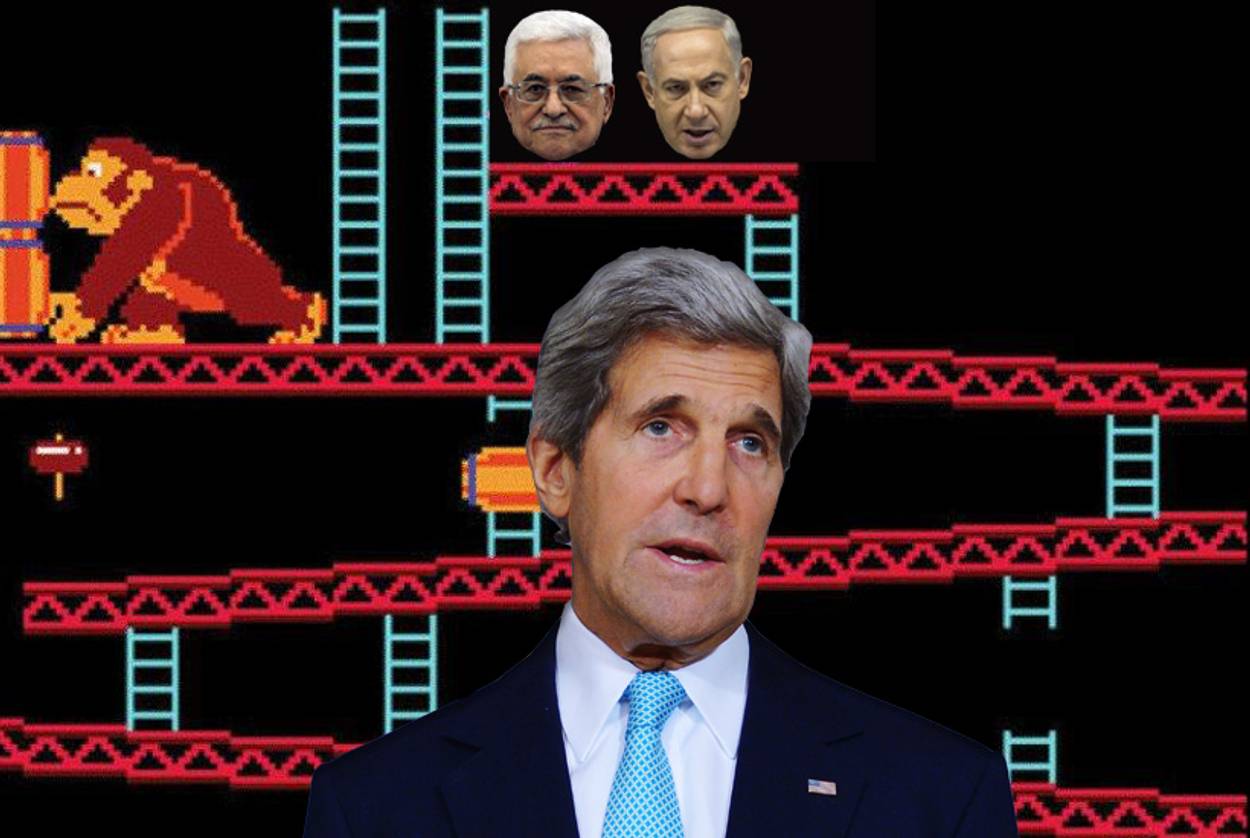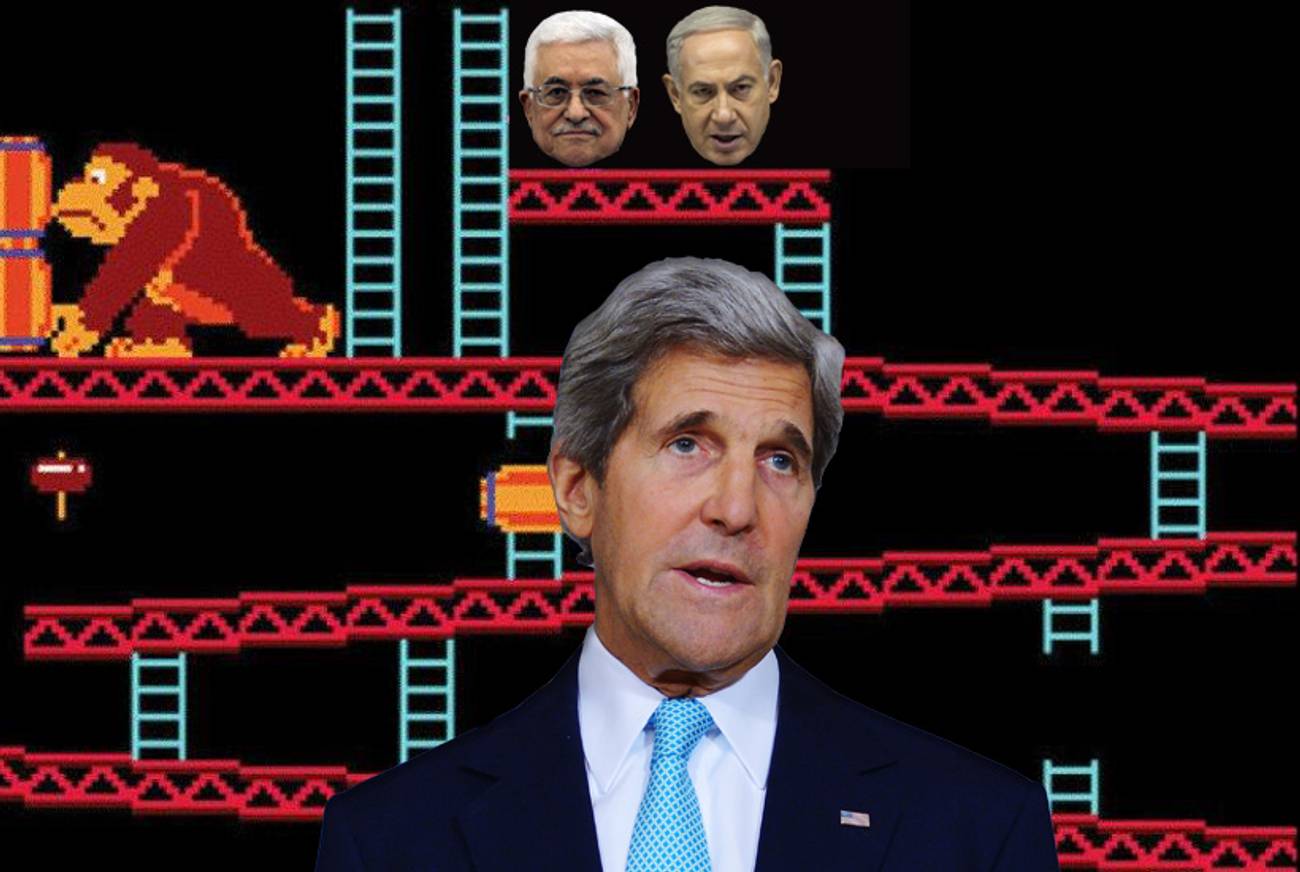To Restart Mideast Peace Talks, John Kerry Should Look to Video Games
From ‘Space Invaders’ to ‘Skyrim,’ video games offer valuable lessons that could help Israeli-Palestinian negotiations




Forget Big Data. Think not of crowdsourcing. Disruption, our sincerest apologies. But of all the insipid terms that the tech industry, an industrious mint of trendy terms, has ever coined, gamification must be the most grating.
In the minds of Silicon Valley’s eternal optimists, and the journalists who so unconditionally love them, gamification is the possibility of rendering intricately complex processes, such as education or health care, more effective by transforming them into games. If kids aren’t reading, goes the gamified mantra, perhaps some friendly competitive system of badges and leaderboards might provide the missing incentive. And if adults are getting a tad too heavy, just slap a gizmo on their wrists that challenges them to burn more and more calories each day and they’ll play along.
As a professor of video games, I’ve strong doubts that the same principles that compel us to save Princess Zelda or defeat Donkey Kong apply in the classroom, the boardroom, or the emergency room. Like most game scholars, I view gamification as the creation of the TED-circle nabobs, largely empty, feel-good fodder for the intellectually limp. But the idea isn’t totally useless: There are some special categories of human events, rare and far-between, whose own innate absurdities are so profound that a touch of gamification might actually do them good.
I’m talking, of course, about the Israeli-Palestinian peace process.
With Secretary of State John Kerry hopping around the Middle East in an effort to restart talks between both parties, a few nuggets of wisdom from the world of play may come in handy. After all, while the conflict itself is real—by which I mean to say a succession of brutalities that have robbed enough men and women on both sides of their possessions, their dignity, and their lives—the process by which we hope to end it is, by every definition, a game.
Consider the evidence: A game, according to our greatest thinker on the subject, the Dutch historian Johan Huizinga, unfurls at its own pace. It takes place in a removed, consecrated space that Huizinga dubbed the Magic Circle, a space impervious to the world’s machinations and demands. It has strict rules that must be obeyed. And, most important, it is not serious. Which, Huizinga emphasized, doesn’t mean play is frivolous: Rather than subscribe to the harsh logic of reality, delivered by the dictates of nature and reason, a game is free to shape its internal workings however it wishes. It can decide that a certain way of grasping the ball is kosher and another, slightly different one, is not. It can compel us to count exactly to 100 before seeking our friends. Play actions are more or less random, sensible only in the world of the game, free of the dire consequences of real life.
If you’ve been following the peace process for the past two decades, you know that much of the above neatly captures its particular grooves. Be it in Camp David or the Aspen Institute’s Wye River Conference Center, Israelis and Palestinians have been meeting outside time and space, separated from the vagaries and violence of life back home. They agreed to ground rules, imposed by their American interlocutors. And they weren’t, in more ways than one, strictly serious.
What advice, then, might the art of play offer Kerry? Three ideas come to mind.
First of all, keep those $4 billion you’re waving around in your pocket: An incentive-based style of negotiations may sound logical, but in games, as the philosopher of play, Prince, so aptly put it, money don’t matter.
The video-game industry figured it out early on. In its nascent days, when games were still housed in large wooden consoles planted in bars or arcades, the prevalent logic was simple: If you performed well, you earned a free game. This logic, inherited from pinball, was obvious enough: We are all taught that time is money, and a free game gave you a free dose of both, another two minutes of play and 25 cents saved. Surprisingly, no one really cared. Time and money are real-world things. Players wanted something greater. They wanted glory. And, in 1978, one ground-breaking Japanese game gave it to them.
Technically speaking, Space Invaders was never much of an innovation. It looked and felt like a hundred other arcade games. But it featured one ingenious innovation: Play well enough, and you were given the chance to add your three-letter initials to an electronic scoreboard preserved in perpetuity for all to see. You no longer got a free game, but you could taunt your friends with verifiable claims of superiority, which was immensely more satisfying.
Decades later, this principle is still strongly in play. Of all the geolocation applications vying for prominence soon after the ascent of GPS-enabled smartphones, for example, it was Foursquare that won the day. Its major insight? Rather than offering people concrete rewards for digitally checking in to restaurants and bars, the service set up a system by which one could become the “mayor” of any given establishment, a meaningless honor but one that many users nonetheless identified as their key incentive to engage with the applications. Put bluntly, bragging rights proved more valuable than free beer.
Kerry should take this insight to heart. He may want to put the cash aside, break with protocol and its calls for even-handedness, and turn the dynamic from a slow crawl toward equilibrium to a competitive rush for superiority. This may sound counterintuitive—isn’t peace, after all, about resolving conflict and finding middle grounds?—but you have only to spend five minutes with video-game players to realize that while surging for glory they are willing to take major risks and adapt much faster to new realities.
But games are not all about moving fast. Sometimes—often, or, if you’re a fan of baseball, almost always—they’re about wasting time. And that’s a great thing.
In a series of wild essays, the French philosopher Georges Bataille, writing in the 1930s, argued that the central tragedy of our time is that we’re just too damn efficient. Anyone who has ever sat at their desk in the afternoon, doing nothing but pretending to work while waiting for the boss to leave would surely empathize with Bataille’s idea that we treat anything that’s not productive as obscene. To survive, he argued, humans needed not only to produce but also to destroy, to do things for no apparent reason, to engage in nonreproductive sexual activities, to go wild, to idle away the afternoon. Waste relieved pressure. Waste was essential.
Video games realize this perfectly well, which is why some new titles may take up to 100 hours to complete. Gamers, designers know, are looking for a central plotline and a mission to complete, but also for the privilege of getting lost in some virtual universe. This is why so many successful games nowadays are so-called open-world games, allowing players to endlessly explore, at their leisure, decidedly nonproductive nooks and corners. Play Skyrim, for example, a popular role-playing game, and you can spend hours prancing around waterfalls or reading books that have nothing to do with the plot, activities that are pointless and therefore pleasurable. Rather than press Israelis and Palestinians to commit to tight timetables, then, Kerry may want to simply let them explore. Having already wasted their share of time, the warring factions may discover that hanging out and talking about nothing could potentially be the most productive thing they’ve ever done.
To transition from empty chatter to concrete steps, however, both sides will need to take ownership of the process. It isn’t easy to do: A peace process, like a video game, is essentially a series of algorithms, if/then propositions that leave very little room for creativity and free will. In negotiations and video games alike, it’s nearly impossible to break the rules, as these have been hardwired into the machine. Good games, then, neither needlessly restrict the players’ options nor leave them confused in a vast and unknowable universe, but allow for a perfect balance of guidance and freedom. Which, for someone who had once selected John Edwards as his running mate, shouldn’t be too hard to master.
***
Like this article? Sign up for our Daily Digest to get Tablet Magazine’s new content in your inbox each morning.
Liel Leibovitz is a senior writer for Tablet Magazine and a host of the Unorthodox podcast.
Liel Leibovitz is editor-at-large for Tablet Magazine and a host of its weekly culture podcast Unorthodox and daily Talmud podcast Take One. He is the editor of Zionism: The Tablet Guide.